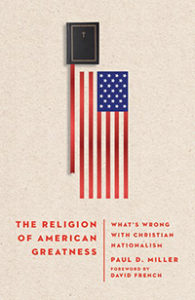The Religion of American Greatness: What’s Wrong With Christian Nationalism
By Paul D. Miller (InterVarsity Press)
While not a new phenomenon in American life, the recent resurgence of Christian nationalism in America creates a need for a reexamination, analysis and critique of the movement. Paul Miller’s thorough research and skilled writing produce a text that, while academic in nature and an excellent resource for university courses on the subject, is a necessary addition to the library and knowledge of anyone seeking faithfully to secure the separation of church and state, to remain committed to their religious beliefs, and to uphold the constitutional stability needed for a thriving body politic.
 Miller lays out his intent with the book from the beginning: “This is a book about the historical development, key beliefs, and political, cultural, and theological implications of Christian nationalism.” His research, with excellent documentation, delves deeply into the various aspects of Christian nationalism. Miller approaches the topic fairly, by allowing the words and writings of those who support the concept of Christian nationalism to help define the meaning of the term and movement.
Miller lays out his intent with the book from the beginning: “This is a book about the historical development, key beliefs, and political, cultural, and theological implications of Christian nationalism.” His research, with excellent documentation, delves deeply into the various aspects of Christian nationalism. Miller approaches the topic fairly, by allowing the words and writings of those who support the concept of Christian nationalism to help define the meaning of the term and movement.
However, Miller utilizes their words and definitions to demonstrate Christian nationalism leads to a breakdown of democracy, an incoherence in theory, a diminished personal liberty, a lack of desire for racial equality and a dangerous foreign policy, all while making governmental power into an idol for those who practice Christian nationalism.
Miller engages with Scripture to demonstrate further the incompatibility of Christian nationalism with both Christian faith and liberal democracy. He disposes of erroneous but popular Christian nationalist concepts, such as America as the new Israel and various Scripture passages taken out of context by Christian nationalists, while also showing how these myths indirectly influence much of American Christianity.
As is often the case when the lines are blurred between church and state, Christian nationalism, in its coopting of Christian terminology and religious practices, does not strengthen the Christian witness but diminishes it, while placing misguided hopes in political power and success. Miller deftly examines this predicament through a brief but thorough history of the Religious Right in American politics.
As most books on politics written today, Miller also connects the resurgence of Christian nationalism to the recent white Christian support of Donald Trump and his political use of Christian nationalism for his own political advantage. Miller examines how the nationalistic leanings of Trump voters, not republican principles and values, led to Trump support among American Christians. However, Miller differentiates the enthusiastic support for nationalism found among those “in the pews” with the quiet nervousness or pushback of the former president found among evangelical leadership, who saw Trump as a threat to their faith’s professed values.
Miller desires for American Christians, along with all Americans, to embrace again the principles of classical liberalism, republicanism, limited government and human rights. He concludes the misguided past decades of the Religious Right failed to produce these values, but he hopes the Christian witness in America can reject the driving forces of Christian nationalism—this is, fear and power—to reembrace the connection with society, striving for a message of hope: one that recognizes the dignity and value of all human beings, and one that desires for religion to inform our politics in a healthy way, through community connection and a healthy view of government and politics.
Jack Goodyear, dean
Cook School of Leadership, Dallas Baptist University















We seek to connect God’s story and God’s people around the world. To learn more about God’s story, click here.
Send comments and feedback to Eric Black, our editor. For comments to be published, please specify “letter to the editor.” Maximum length for publication is 300 words.